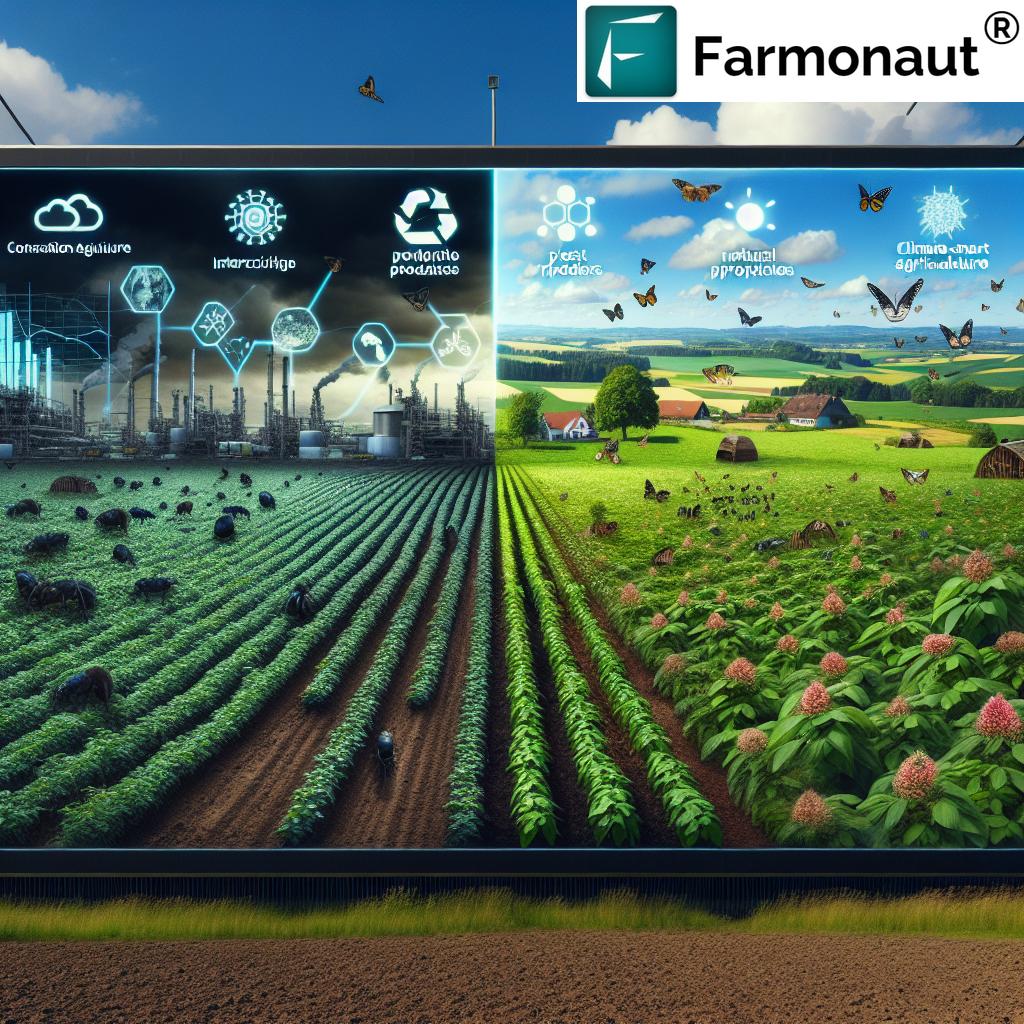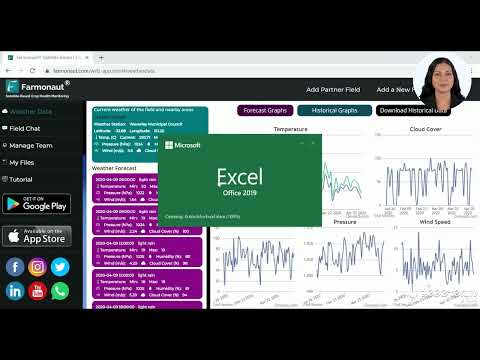Sustainable Plant Health Management in Europe: Balancing Integrated Pest Control and Environmental Protection

“EU farmers face a 50% reduction in available plant protection products, challenging sustainable agriculture practices.”
In the ever-evolving landscape of European agriculture, we find ourselves at a critical juncture where sustainable plant health management has become more crucial than ever. As representatives of Farmonaut, a leading agricultural technology company, we understand the intricate balance between effective pest control and environmental preservation. This comprehensive exploration delves into the challenges and opportunities facing European farmers as they navigate the complex terrain of integrated pest management (IPM) and sustainable farming practices.
The European Agricultural Landscape: Challenges and Opportunities
European agriculture is undergoing a significant transformation. With the implementation of stringent EU agricultural policies and increasing environmental concerns, farmers are facing unprecedented challenges. The reduction in available plant protection products has necessitated a paradigm shift in how we approach crop health and pest management.
- Declining availability of conventional pesticides
- Growing emphasis on sustainable farming practices
- Increasing pressure to maintain crop yields while reducing environmental impact
- Need for innovative solutions in plant health management
These challenges, however, also present opportunities for innovation and the adoption of more sustainable practices. At Farmonaut, we are at the forefront of this agricultural revolution, providing farmers with cutting-edge satellite-based farm management solutions to address these pressing issues.
Integrated Pest Management: A Cornerstone of Sustainable Agriculture
“Integrated Pest Management combines at least 8 different strategies to effectively control pests while minimizing environmental impact.”
Integrated Pest Management (IPM) has emerged as a crucial strategy in sustainable plant health management. This holistic approach combines various methods to control pests and diseases effectively while minimizing environmental impact. Let’s explore the key components of IPM and how they contribute to sustainable agriculture in Europe:
- Cultural Control: Implementing crop rotation, adjusting planting dates, and improving soil health to naturally deter pests.
- Biological Control: Utilizing natural predators and parasites to manage pest populations.
- Mechanical Control: Using physical barriers and traps to prevent pest infestations.
- Chemical Control: Judicious use of pesticides as a last resort, focusing on targeted applications.
- Genetic Control: Developing and planting pest-resistant crop varieties.
- Monitoring and Forecasting: Regularly assessing pest populations and predicting outbreaks.
- Sanitation: Maintaining clean fields and removing potential pest habitats.
- Education and Training: Providing farmers with knowledge and skills for effective IPM implementation.
By incorporating these strategies, European farmers can significantly reduce their reliance on chemical pesticides while maintaining crop health and productivity. This approach aligns perfectly with the EU’s goals for sustainable agriculture and environmental protection.
The Role of Technology in Modern Plant Health Management
In the digital age, technology plays a pivotal role in advancing sustainable plant health management. At Farmonaut, we leverage cutting-edge technologies to empower farmers with data-driven insights and precision farming capabilities.
Our satellite-based crop monitoring system provides real-time data on crop health, enabling farmers to detect pest infestations and diseases early. This proactive approach allows for timely interventions, reducing the need for broad-spectrum pesticide applications.
Key technological advancements in plant health management include:
- Remote sensing and satellite imagery for early detection of crop stress
- AI-powered pest identification and treatment recommendations
- Precision application technologies for targeted pesticide use
- IoT sensors for real-time monitoring of field conditions
- Big data analytics for predictive pest modeling
These technologies not only enhance the effectiveness of IPM strategies but also contribute to overall farm efficiency and sustainability. By providing farmers with accurate, timely information, we enable them to make informed decisions that balance crop protection with environmental stewardship.
EU Agricultural Policy and Its Impact on Plant Health Management
The European Union’s agricultural policy plays a significant role in shaping the landscape of plant health management across the continent. Recent policy shifts have emphasized the need for more sustainable farming practices, influencing how farmers approach pest control and crop protection.

Key aspects of EU agricultural policy affecting plant health management include:
- Pesticide Regulations: Stricter controls on pesticide use and a push towards reducing chemical inputs.
- Green Deal and Farm to Fork Strategy: Ambitious targets for reducing pesticide use and promoting organic farming.
- Common Agricultural Policy (CAP) Reform: Incentives for farmers adopting sustainable practices and IPM strategies.
- Research and Innovation Funding: Support for developing alternative pest control methods and sustainable farming technologies.
These policy initiatives have created both challenges and opportunities for European farmers. While the reduction in available plant protection products has made pest management more complex, it has also spurred innovation in sustainable farming practices.
At Farmonaut, we recognize the importance of aligning our technologies with these policy objectives. Our API and API Developer Docs provide developers and researchers with access to crucial agricultural data, facilitating the development of policy-compliant farming solutions.
Organic Farming and Its Role in Sustainable Plant Health Management
Organic farming has gained significant traction in Europe as a sustainable alternative to conventional agriculture. This approach to farming aligns closely with the principles of IPM and plays a crucial role in maintaining plant health while minimizing environmental impact.
Key aspects of organic farming that contribute to sustainable plant health management include:
- Use of natural pest control methods and biopesticides
- Emphasis on soil health and biodiversity
- Crop rotation and intercropping to disrupt pest cycles
- Promotion of beneficial insects and natural predators
- Strict regulations on synthetic pesticide and fertilizer use
While organic farming presents its own set of challenges, particularly in terms of yield management and pest control, it offers significant benefits for environmental protection and long-term soil health. The principles of organic farming can be applied even in conventional farming systems to enhance sustainability.
Farmonaut’s technologies support organic farmers by providing detailed insights into crop health and soil conditions, enabling them to make informed decisions without relying on synthetic inputs. Our mobile apps for  and
and  platforms provide easy access to these insights, empowering farmers to implement effective organic farming practices.
platforms provide easy access to these insights, empowering farmers to implement effective organic farming practices.
Climate-Smart Agriculture: Adapting Plant Health Management to Environmental Changes
Climate change poses significant challenges to plant health management in Europe. Changing weather patterns, increased pest pressures, and extreme weather events require adaptive strategies to maintain crop health and productivity. Climate-smart agriculture (CSA) offers a framework for addressing these challenges while promoting sustainability.
Key elements of climate-smart agriculture in plant health management include:
- Drought-resistant crop varieties and water-efficient irrigation systems
- Conservation tillage to improve soil health and carbon sequestration
- Diversification of crop systems to enhance resilience
- Use of climate forecasting for informed decision-making
- Adoption of agroforestry practices to mitigate climate impacts
At Farmonaut, we recognize the importance of climate-smart approaches in modern agriculture. Our satellite-based monitoring system provides farmers with crucial climate and weather data, enabling them to adapt their plant health management strategies to changing environmental conditions.
The Future of Plant Health Management in Europe
As we look to the future of plant health management in Europe, several key trends and developments are shaping the landscape:
- Biocontrol and Biopesticides: Increasing research and adoption of biological control agents and naturally derived pesticides.
- Precision Agriculture: Further integration of AI, IoT, and robotics in farming practices for targeted pest management.
- Gene Editing: Development of pest-resistant crop varieties through advanced breeding techniques like CRISPR.
- Circular Economy in Agriculture: Exploring ways to recycle and repurpose agricultural waste for pest management.
- Cross-Border Collaboration: Enhanced cooperation between EU member states in pest surveillance and control strategies.
These developments present exciting opportunities for sustainable plant health management. However, they also require ongoing research, policy support, and farmer education to ensure effective implementation.
Comparative Analysis of IPM Strategies in European Agriculture
| IPM Strategy | Pest Control Effectiveness (%) | Environmental Impact | Cost-Effectiveness (€/hectare) | Adoption Rate in EU (%) | Compatibility with Organic Farming |
|---|---|---|---|---|---|
| Biological Control | 75-85 | Low | 100-300 | 40 | Yes |
| Cultural Practices | 60-70 | Low | 50-150 | 70 | Yes |
| Resistant Crop Varieties | 70-80 | Low | 200-400 | 55 | Yes |
| Precision Agriculture Technologies | 80-90 | Medium | 300-600 | 35 | Yes |
| Chemical Control (Targeted) | 85-95 | Medium-High | 150-350 | 80 | No |
This table provides a comprehensive overview of various IPM strategies, their effectiveness, environmental impact, and adoption rates in European agriculture. It highlights the diversity of approaches available to farmers and the trade-offs involved in each strategy.
Conclusion: A Balanced Approach to Plant Health Management
As we navigate the complex landscape of sustainable plant health management in Europe, it’s clear that a balanced approach is key. Integrating various strategies, from IPM to organic farming practices and climate-smart agriculture, offers the best path forward for European farmers.
At Farmonaut, we are committed to supporting this balanced approach through our innovative technologies and data-driven insights. By providing farmers with the tools they need to make informed decisions, we contribute to a more sustainable and resilient agricultural sector in Europe.
The future of plant health management in Europe is one of continuous innovation, adaptation, and collaboration. By embracing sustainable practices, leveraging technology, and aligning with EU agricultural policies, we can ensure a healthy, productive, and environmentally friendly farming sector for generations to come.
Frequently Asked Questions (FAQ)
- What is Integrated Pest Management (IPM)?
IPM is a holistic approach to pest control that combines various strategies to manage pest populations effectively while minimizing environmental impact and reducing reliance on chemical pesticides. - How does EU agricultural policy affect plant health management?
EU policies have introduced stricter regulations on pesticide use, promoted sustainable farming practices, and provided incentives for farmers to adopt IPM strategies, significantly influencing how plant health is managed across Europe. - What role does technology play in modern plant health management?
Technology, such as satellite imaging, AI, and IoT sensors, plays a crucial role in early pest detection, precision application of treatments, and data-driven decision-making in plant health management. - How does organic farming contribute to sustainable plant health management?
Organic farming promotes natural pest control methods, enhances soil health, and supports biodiversity, all of which contribute to long-term plant health and environmental sustainability. - What is climate-smart agriculture, and how does it relate to plant health?
Climate-smart agriculture involves adapting farming practices to changing climate conditions. It includes strategies like using drought-resistant crops and water-efficient irrigation, which help maintain plant health in the face of environmental challenges.




